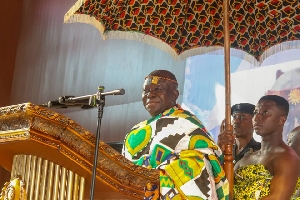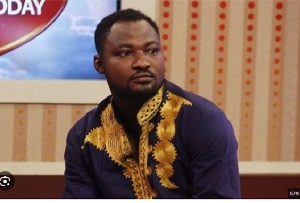Opinions of Sunday, 19 October 2014
Columnist: Akapule, Samuel Adadi
Rippling effects of reshuffling Regional Ministers
...The Upper East Scenario
Samuel Adadi Akapule, Bolgatanga
There are two schools of thought when it comes to the issue of reshuffling Regional Ministers. The first school of thought postulates that reshuffling of Regional Ministers brings about cohesion and national unity. Such school of thought is of the view that the Regional Minister’s job is a very sensitive one often riddled with ethnic groups accusing Ministers of bias, meddling in traditional matters or siding with one group against the other in matters of conflicts. Hence, the belief that in sending a non-indigenous Minister to a different region, it could help cure this unhealthy perception.
The second school of thought, however, holds on the contrary that indigenous Regional Ministers would be better placed when it comes to the development of the Regions since they already know the developmental needs of their regions and would therefore appreciate it better when implementing government policies and programmes.
The Presidency of President John Dramani Mahama, I believe, belongs to the first school of thought. During the 2013 Regional Ministers reshuffle, it was explained that the exercise was intended to "foster national unity" and to ensure that Regional Ministers focused mainly on the political and technical coordination of the development efforts of Metropolitan, Municipal and District Assemblies (MMDAs).
After serious agitations , confrontations and in some instances demonstrations embarked upon by some Regions to protest against the reshuffling , the matter was allowed to lay to rest based on the fact that the Constitution empowers the President to appoint , reshuffle and dismiss Regional Ministers.
Then came another directive on 15th of March, 2014 from the Office of the President about the reshuffling of the Regional Ministers, sending them to their home regions just after the Regional Ministers had settled in their various regions and spent time and resources visiting traditional authorities who are the custodians of the people to seek for their support in ruling the Regions including the consultation of other major stakeholders.
Per the constitution of Ghana, it is true that it is the President, with the approval of Parliament, who appoints a Regional Minister for each of the regions of Ghana. It is also very clearly stated that it is the duty of the Regional Ministers to represent the President in the regions. They are responsible for the coordination and direction of the administration in the region. .Each Regional Minister is the Chairman of the Regional Coordinating Council (RCC). The RCC consists of the Regional Minister and his Deputies, the Presiding Member and the District Chief Executive from each district in the region, two chiefs from the Regional House of chiefs, and the Regional Heads of the ministries and representatives of the Security Agencies. These more or less form the Regional Government, charged with the responsibility of ensuring the efficient and effective utilization of public resources, directing private sector investments and interventions for the
general good of the citizens of the region. Thus the importance of the Regional Minister in the development of a region cannot be overemphasized.
DISSATISFACTION OF THE STAKEHOLDERS
The Upper East Region is now the only Region in Ghana that seems not to have a Regional Minister even though one was appointed and approved of by parliament.
It would be recalled that Mr James Tiiga who was appointed and vetted by Parliament and approved to take over from Dr Avea Nsoh, reported to Office in July 2014 this year. He later left for New York where he was working as the Ghana Permanent UN Mission, with the purpose to hand over his job and to return to Ghana to assume his duty fully. However, he has since not returned. In fact speculations are being peddled in the Region by many people that Mr Tiiga had turned down the President offer and thus his delay in returning to office.
Many citizens in the Region particularly the Municipality including the various political parties on daily basis continue to express misgivings about the absence of a Substantive Regional Minister in the Region. According to them the Region has no Regional Minister. Most of the stakeholders are of the view that the President had not treated the Region fairly and that it was the only Region that did not have a substantive Regional Minister.
It is not surprising therefore that it is not only the traditional rulers and indigenes of the area who are peeved about the government’s last ministerial reshuffle but the various political parties such as the News Patriotic Party, the People National Convention Party(PNC ) Progressive People Party(PPP) and Civil Society Organizations(CSOs) among other stakeholders.
Mr Francis Adingo, the Upper East Youth Association Organizer stated that the Region is one of the poorest among the ten Regions and to deal with its developmental challenges, there is the need for it to get a Minister who has to be around to galvanize support and dialogue with the citizens to fashion out a roadmap for the Region’s development.
“Being absent means there is no coordinated activities to address the Region’s developmental challenges and we in the Upper East Region are the losers at the end of the day”, Mr Adingo said.
According to Mrs Margaret Akolgo ,one of the leaders of the Bolgatanga Market Women Association, the Northern Region which is made up of 28 Districts was big enough for Alhaji Limuna Mohammed-Muniru to handle and therefore it would be unfair to expect him to handle the Upper East Region in addition to that huge responsibility in the Northern Region.
Mr Mathias Aboba, a Development Practitioner, was also of the view that the Region abounds with issues of uncompleted projects and shoddy works by contractors and required the presence of a Regional Minister for effective supervision of all the projects to ensure timely execution of projects and good quality work.
“The absence of a Substantive Minister therefore means that anything goes when it comes to the Upper East Region”, he observed.
According to the Citizens, good programmes such as the Regional Development Strategy that was started by Dr Avea, the former Regional Minister had been abandoned.
As a Journalist who has worked in the Region for almost 10 years, I share some of the sentiments raised by the stakeholders. Viewing the quantum of work assigned to Regional Ministers, there is no way one can perform efficiently if he is made to handle the affairs of two regions which has about 29 Metropolitan, Municipal and Districts in addition to 13 Districts making an overall of 42 with different Political, Social and Cultural environment and long distances from one another.
Aside, I think the people of the Region has a constitutional mandate to demand from the President and Parliamentarians the whereabouts of Mr Tiiga, who they appointed to run the affairs of the Region .
What is amazing is that should Mr Tiiga resume Office as the usual custom demands he has to spend more time and resources visiting more than the 10 paramount traditional councils including consulting some key stakeholders before settling down to work. It is also high time for the appointee to listen to the people in the Region who are calling on him to come and serve them as he opted to do.
CONCLUSION
To sum up, the Region which is one of the poorest regions in the country has over the years experienced political turbulence and unstable leadership under the current government. Taken into cognizance the nature of the place, prudent thinking and consultations from people who are more development oriented should be sought for when reshuffling in future. The Region abounds with a lot of natural resources and needs a real and dedicated leadership drive to turn the fortunes of the area around. .













